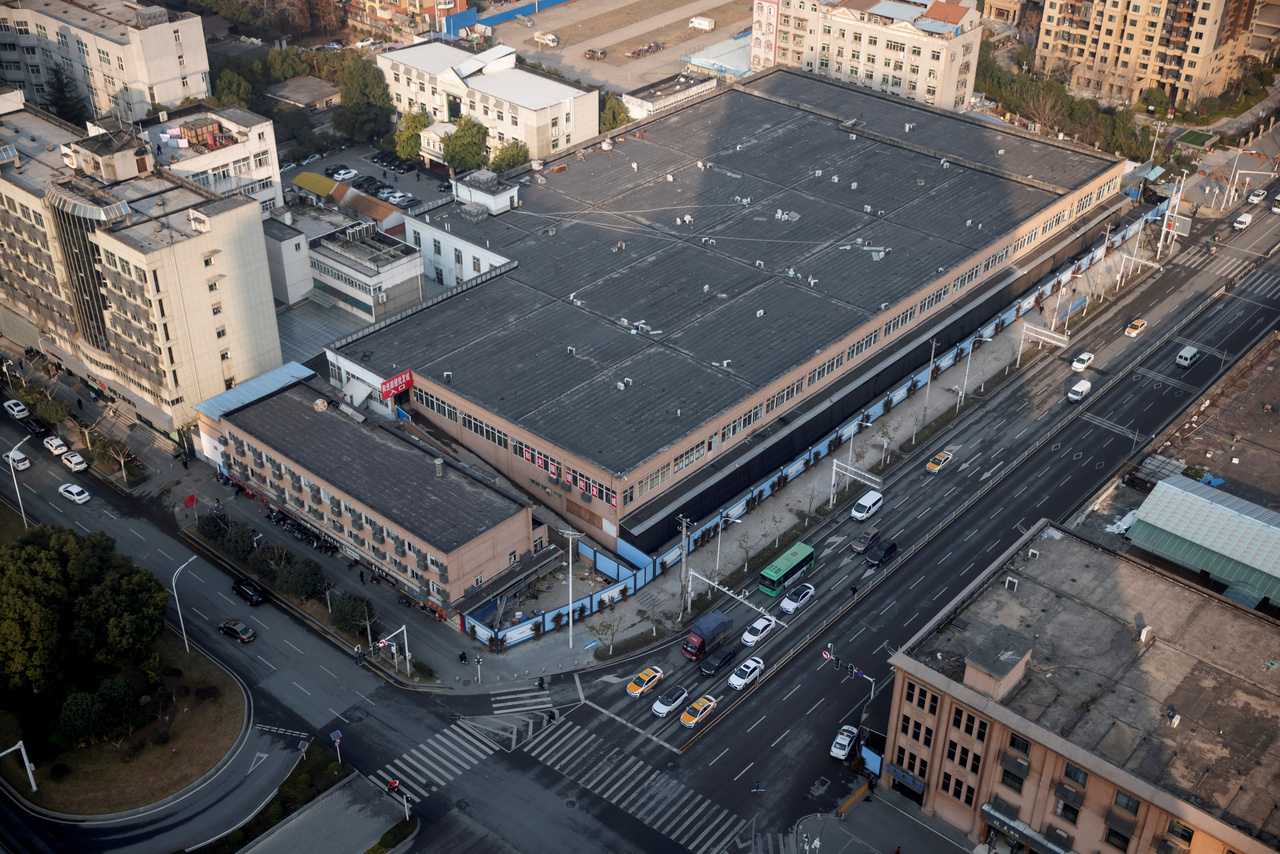WHO team visits Wuhan market, where first Covid-19 cases were reported
Sign up now: Get insights on Asia's fast-moving developments

Experts say the Huanan market still plays a role in tracing the origins of the virus, since the first cluster of cases was identified there.
PHOTO: REUTERS
WUHAN, CHINA (AFP, REUTERS) - A team of World Health Organisation (WHO) experts investigating the origins of Covid-19 visited a market in Wuhan on Sunday (Jan 31) where one of the first reported clusters of infections emerged over a year ago.
Members of the group arrived at Huanan wholesale seafood centre - which has been sealed since January last year - driving into its barricaded premises as guards quickly blocked others from entering, according to journalists at the scene.
The mission, delayed by China and weighed down by political baggage, has a remit to explore how the virus jumped from animal to human.
But with the fieldwork element of a trip in its early stages, WHO officials have already downplayed expectations of finding the source of a virus which has killed more than two million people and devastated the global economy.
The WHO also said on Friday that team members would be limited to visits organised by their Chinese hosts and would not have any contact with community members, due to health restrictions.
On Sunday, the WHO team arrived at the Huanan market as part of a long-planned trip now closely monitored by the Chinese authorities.
Team member Peter Daszak wrote on Twitter following the market tour that the group was on "very important site visits...a wholesale market first & Huanan Seafood Market just now".
"Very informative & critical for our joint teams to understand the epidemiology of Covid as it started to spread at the end of 2019," he said.
The experts did not take any questions and the sprawling market remains boarded up. Security staff told reporters outside to leave and shook a tall ladder on which a photographer was sitting for a better view. The experts left in a convoy after about an hour.
Public access to the market - now barricaded, with guards on round-the-clock duty - has been severely restricted since it was shut at the beginning of last year. Before its closure, it was a bustling market comprising hundreds of stalls divided into sections for meat, seafood and vegetables.
On Dec 31, 2019, after four cases of a mystery pneumonia were linked to the market, it was shuttered overnight. By the end of January, Wuhan had gone into a 76-day lockdown.
Some Chinese diplomats and state media have said they believe the market is not the virus' origin, and have thrown support behind theories that it potentially originated in another country.
Earlier this week, state media outlet Global Times published a report downplaying the importance of Huanan as an early epicentre of the virus, claiming that "subsequent investigations" have suggested that the market was not the source of the outbreak.
On Sunday, the tabloid argued that "the possibility that the coronavirus was passed on from cold-chain products into Wuhan, or more specifically, to the Huanan wet market...cannot be ruled out".
Chinese officials identified wild animals sold in the market as a likely source of the outbreak in initial stages of the pandemic, clamping down on the exotic animal trade in response.
A price list issued by a merchant at the emporium, which circulated online, showed an array of exotic wildlife available including civets, snakes and even live wolf pups.
Since then, state media have thrown support behind suggestions that the virus may have originated elsewhere, with a resurgence of local infections blamed instead on imports.
On Sunday morning, WHO's expert team visited another site in Wuhan, the massive Baishazhou wholesale market, where business plunged after the outbreak.
While they entered the cold storage section, a speaker blasted a message: "No imported cold chain products are allowed on display; no cold chain products are allowed to be sold separately".
Chinese authorities have relentlessly pushed a positive narrative of heroism and decisive action in their fight against the coronavirus that has spurred an economic recovery and kept deaths down to 4,636.
On Saturday, the WHO experts' itinerary included an exhibition in Wuhan lauding the emergency response of the city's health authorities in the outbreak and the marshalling of the crisis by China's President Xi Jinping.
China has faced criticism at home and abroad for downplaying the initial outbreak and concealing information when it first emerged in Wuhan in December 2019.
Details of the WHO team's itinerary have remained thin, with international media kept firmly at arm's length - the only glimpses of the trip have come through broadly positive tweets by some members of the expert team.
China continues to take a firm line against a recent surge in infections, with 12 officials in northeastern Harbin city recently punished for dereliction of duty after a cluster of cases in a food processing company.
Experts say the Huanan market still plays a role in tracing the origins of the virus, since the first cluster of cases was identified there.
Following a two-week quarantine in the city that ended last Thursday, the WHO team is expected to visit laboratories, other markets and hospitals in Wuhan.
The WHO-led probe in Wuhan has been plagued by delays, concern over access and bickering between China and the United States, which accused China of hiding the extent of the initial outbreak and criticised the terms of the visit, under which Chinese experts conducted the first phase of research.
The team had been set to arrive in Wuhan earlier in January, and China's delay of their visit drew rare public criticism from the head of the WHO, which former US president Donald Trump accused of being "China-centric".


